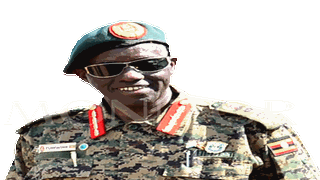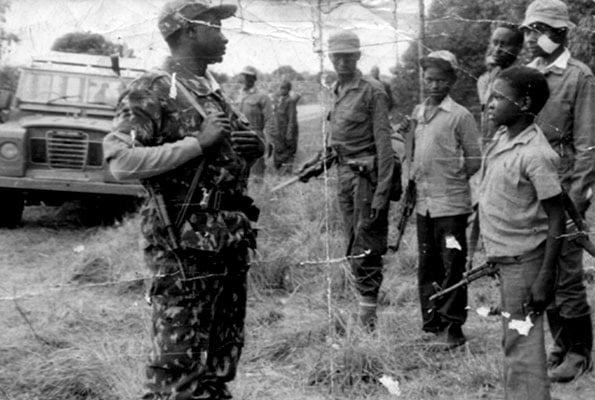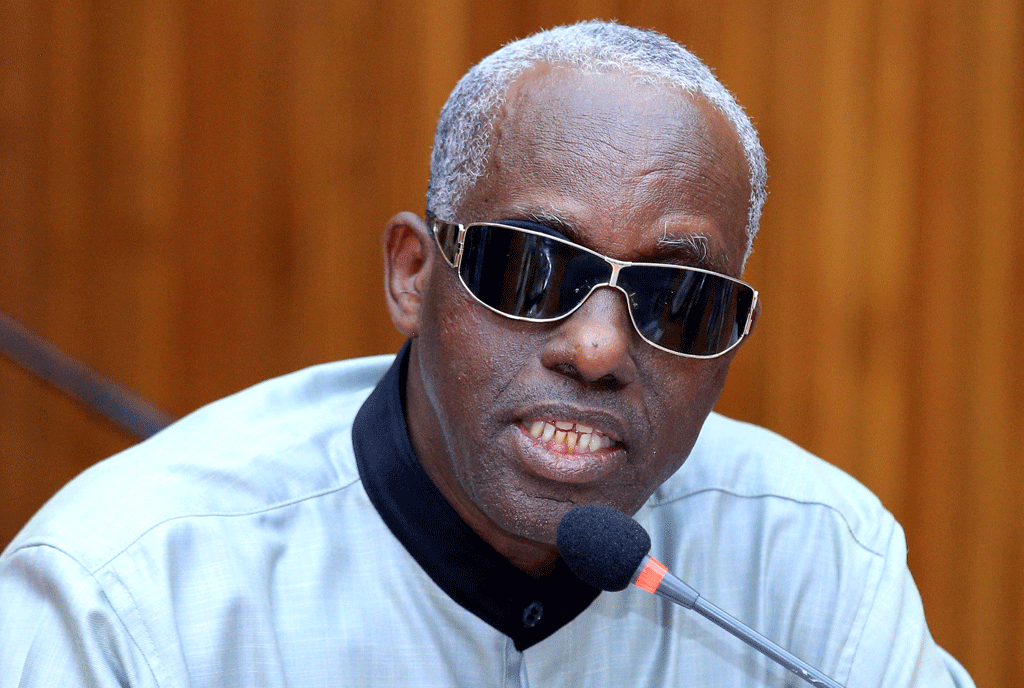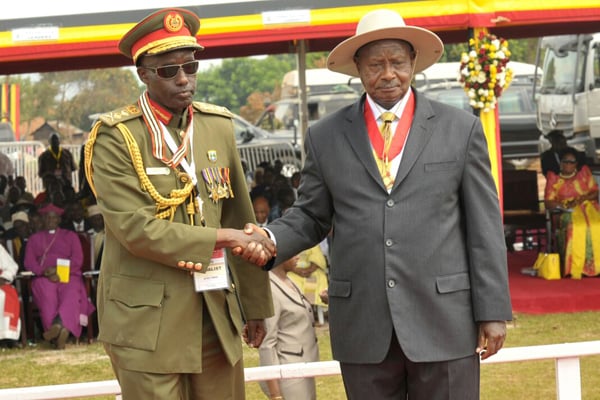
Ex-Security minister Gen Elly Tumwine. PHOTO/ABUBAKER LUBOWA
|National
Prime
In Gen Tumwine, cancer snatches UPDF legend loved, hated in life and death
What you need to know:
- The four-star general often said he has gone through a lot of tribulations, but survived most of them by the grace of God.
Gen Elly Tumwine, 68, the former Minister of Security, has died. He succumbed to lung cancer at Aga Khan Hospital in Nairobi, Kenya, where he was admitted on August 11.
President Museveni made the announcement of the death of Gen Tumwine, the first commander of the National Resistance Army (NRA), the precursor to Uganda People’s Defence Forces (UPDF), which brought the current government to power in 1986.
“Countrymen and countrywomen, especially the NRM- NRA- UPDF fraternity. With deep sorrow, I announce the death of General Elly Tumwiine which occurred at 5:46am [yesterday] in Nairobi, from lung cancer,” the President noted.
Gen Museveni added: “He has been a dedicated and hard-working cadre. More will be said about him later. Condolences to his family, to the NRA-UPDF-NRM fraternity and to all Ugandans.”
Gen Tumwine was born in Burunga Village in the present-day Kazo District in western Uganda on April 14, 1954.
His childhood was a struggle for survival and escape from the grip of poverty.
The four-star general often said he has gone through a lot of tribulations, but survived most of them by the grace of God.
Shockingly, most of his misfortunes strike in the last months of the year. As such, he dedicates November each year to thank God for giving him life.
His afflictions started when he was a baby. “I was climbing the back of my mother. I fell back on to a big snake that bit me on my thigh. I almost died,” Gen Tumwine said on the Life Stories programme on our sister, NTV Uganda, television station.
Gen Tumwine said his parents used traditional methods to treat him successfully, but the wound left a big scar on his thigh. Snakes bit him two other times; one while grazing cattle and the other when returning from school. But in all incidents, he survived the snake venom.
Another incident that he couldn’t erase in his memory happened when he was around nine-years-old, in 1963.
Their father ordered them to move out of the house to see if it had started raining. No sooner had his elder brother flanked the door ajar than lightning struck.
“It struck my elder brother dead. My other brother was also struck that his part of the body failed. He died later due to the injuries. My father was also affected. It also struck me and burnt my belly. I became unconscious. After gaining consciousness, I was admitted to Mubende Hospital for a very long time. After discharge, I spent months without eating solid food,” he said.
He was able to persevere and continued with his primary education at Burunga Primary School.
Ms Mary Karooro Okurut, a former presidential spokeswoman and minister, who is a personal friend to the general with whom she was in same languages class cohort at Makerere University, said Tumwine exhibited brilliance and love of art at atender age.
“My father was a Gombolola chief; so we, as a family, visited Burunga in Kazo. Gen Tumwine’s family was one of the homes we visited. I recall Gen Tumwine recited ekyevugo (a heroic poem in Runyankole) and everyone was mesmerised by his brilliance,” Ms Okurut said yesterday.

Elly Tumwine (right) and his family at Grand Imperial Hotel on March 7, 2000. PHOTO/FILE
In 1967, during his primary seven classes, he came into contact with Mr Yoweri Museveni, future Ugandan president, who was then a part-time teacher at their school after completing A-Level and before joining Dar es Salaam University later that year.
“He (Mr Museveni) was in his senior six vacation and came to our school to teach. I saw him in class and I was impressed by his vision,” Tumwine said.
Fortunately, while visiting a friend at home, teacher Museveni too visited the same person.
“At night, as they were seated at a bonfire, Mr Museveni started preaching the poverty alleviation gospel to my friend saying that ‘he should stop nomadism and fence off his farm before growing food crops on a quarter of an acre’,” he recollected.
Mr Museveni’s plan stuck in Tumwine’s heart. He was shocked that Mr Museveni could move with his own bathing sponge, a towel and other effects while on a visit, a tradition that was uncommon among members of their community then.
Gen Tumwine said he passed Mr Museveni’s subject at Primary Leaving Examination level and joined secondary school at Mbarara High School. At one time, he was the president of the history club at their school.
He would later join Makerere University where he did a degree in fine art and later a diploma in education.
Ms Okurut said Gen Tumwine was very humble while at university and in their education class.
“He was very humble and very intelligent. He had humorous jokes,” she said.
After university, he joined the teaching profession in western Uganda schools specialising in fine art.
In the late 1970s, while at Kitunga High School, the war against Idi Amin broke out.
“When I heard that Museveni was part of the Front for National Salvation (Fronasa), [the precursor to NRA], I didn’t hesitate to join them,” he said.
He and others were taken to a Fronasa training camp in Kakoba in Mbarara District, where they gained basic military skills. Afterwards, they moved to Monduli Military Academy in Tanzania for a cadet course.
They passed out as officers, and they re-joined the army and at one point he was an instructor at Masindi Training School. After the contested December 1980 general elections, Mr Museveni, who lost, true to his earlier threat if the poll was rigged, headed to start the NRA rebel group. Among the pioneer fighters was RO 0023 Elly Tumwine.
His defining moment was on February 6, 1981, when he, Mr Museveni and others went to Kabamba military barracks for an undercover mission to seize arms.
In his book, Sowing the Mustard Seed, President Museveni recalls that Tumwine was seated in the front passenger seat of the truck when they approached the quarter guards. His brief was to convince the soldiers at the check-point that he had brought in supplies from the general headquarters.
But one of the soldiers detected this was a decoy for a security breach.
“He (soldier) panicked and rushed to get his gun. Tumwine fired at him and the sound of the pistol alerted the one Tanzanian soldier who was inside the armoury,” President Museveni wrote in his book.

President Museveni and Elly Tumwine during an exhibition at Nommo Gallery in Kampala in November 15, 2000. PHOTO/FILE
Although the plan didn’t succeed, Tumwine had shot the first bullet, in panic, to gain future fame in starting the five-year NRA armed struggle against Milton Obote’s government.
President Museveni said Tumwine would have grabbed the soldier and wrestle him down without alerting the Tanzanian soldiers to enable them reach the armoury before being detected.
Nonetheless, on February 18, 1981, Tumwine led a successful ambush against the Tanzanian soldiers at Kyekumbya.
According to President Museveni, the successful ambush gave their militants morale that they were able to attack superior and well-armed forces if they were well organised.

Commander Museveni talking to young NRA soldiers during the bush war. FILE PHOTO
Mr Museveni appointed Tumwine a leader of one of the six zonal units. The unit he led was called Kabalega, and it was based in Kapeeka, Nakaseke District. The unit drew its name to honour the heroic and warrior Bunyoro King Kabalega, who fought the British.
Losing eye
On November 1, 1981, Tumwine would get a physical loss that he still remembers to his death.
As they were battling a garrison of government soldiers at Bukomero in Kiboga District, he was shot in the head and the bullet exited through his left eye.
“Everyone thought I was going to die,” he recalled as he was being rushed on a bicycle from one rebel camp to another. “But I told them I was going to survive.”
“That is the spirit that has lived with me up to now,” he said on NTV Life Stories.
Through rebel collaborators, he was later taken to Mulago Hospital where he was operated on to save his life.
“When I was brought out of the theatre and anaesthesia was waning off my head, I kept shouting that ‘we were going to fight Obote’,” he said, prompting some of the doctors that had helped him get treatment to go into hiding.
The November incident affected him so much that he dedicated the month every year to celebrate how God saved him.
Recollecting such personal tragedies is a common tactic by the NRM historicals whenever cornered, or when they want to project battlefield sacrifices and successes.

Then Security minister Gen Elly Tumwine appears before the Human Rights Committee of Parliament on September 4, 2019. PHOTO/DAVID LUBOWA
He went on to become a commander of the NRA and a member of the High Command during the bush era. He was replaced as the NRA commander in 1987, a year after they had taken power, by Gen Caleb Akandwanaho, alias Salim Saleh, the younger brother of President Museveni.
Gen Tumwine is number two of six original members of the then NRA High Command as of January 26, 1986, according to the UPDF Act, 2005.
The others are President Museveni, his brother Gen Salim Saleh, Gen David Tinyefuza (now David Sejusa), late Eriya Kategaya and Maj Gen Matayo Kyaligonza.
By virtue of being a historical member of the High Command, Gen Tumwine and five others are permanent members of the Defence Forces Council and High Command, both the army’s highest policy and decision-making organs.
His late attendance of the High Command meeting at State House Entebbe was last month, which came hot on the heels of the military being placed on Standby Class One, the highest level of combat readiness.
In 1989, the President named him the State Minister of Defence. He was also an army representative in Parliament.
The general was until 1996, when Uganda held its first vote under President Museveni, the director general of Uganda’s External Security Organisation (ESO), which collects and analyses intelligence aboutstates and individuals outside Uganda.
He was a man of many lives and many things rolled into one: sturdy soldier, artist, entrepreneur, farmer, singer and dancer, and a devout Christian.
At a personal level, he was father and grandfather. Shortly after his death was announced yesterday, a video clip surfaced on social media in which he was captured dancing in turns with his children and wife, showing his side as a family man.

Then director of External Security Organisation Elly Tumwine and Brig Jim Muhwezi during the swearing-in ceremony of President Museveni in 1996. PHOTO/FILE
But Tumwine was also a man of controversy. As a former rebel, army commander and spymaster, he transitioned to political leadership as minister in various portfolios with a pistol always tucked to his waistline.
Then accusations began flying about him intimidating others with a pistol. Among the complainants were MPs.
Critics, both in and outside Parliament, also derided his showy display as calculated to hold the country at ransom for a destructive war that no one voted the fighters to fight, and a convenient pretext to evade scrutiny for official commissions and omissions.
The perception that the old guard hold a sense of entitlement has led Gen Tumwine to clash with opponents on the floor of Parliament and in television studios over the years.
Honouring heroes
In 2001, he put up a spirited fight in Parliament for the establishment of medals to honour heroes. When the law was passed, he benefitted as the first national chairman of the medals awards committee.
He often used Heroes Day, Liberation Day and Tarehe Sita week alongside other national celebrations to give the history of the NRA guerilla struggle and he would often shed tears as he remembered his comrades who had passed on.
As the curtains drew on him yesterday, the career soldier and politician joined the spiritual world of his deceased comrades-in-arms.
News of his death polarised the country, and netizens were split in social media comments between mourning and saying good riddance.
In life, he had a divisive side too, both in and outside the military. Possession of high-level power for decades appeared to make him self-entitled in ways criticizing him attracted a rebuke, almost along the lines: Where were you when we fought to liberate this country?
He was at times abrasive, other moments solemn, but mostly a high-pitched spiritual man of many talents.
Singing one of his most loved NRA patriotic songs titled, Kino kye kiseera kye tulina okulwana (This is the time we have to fight so that we can have peace in the future), welled tears in his eyes.
In 2001, as President Museveni struggled to deal with corruption in the army, he appointed Tumwine chairman of the General Court Martial, the military’s highest appellate court.
Despite the new role, he remained in Parliament as an army representative for more than three decades.
On May 9, 2002, during the debate of Political Parties and Organisation Bill, 2001, Gen Tumwine allegedly assaulted the then Omoro County MP, late Jacob Oulanyah in Parliament lobby, according to The Monitor story published in May 2002.
Gen Salim Saleh allegedly separated the two lawmakers and he reportedly ordered Tumwine to go away, the story stated.
Both Gen Tumwine and MP Oulanyah were summoned by the Parliament’s Rules, Privileges and Discipline Committee that was chaired by Ms Hope Mwesigye, the then Kabale Woman Member of Parliament.

Then Omoro County MP and deceased former Parliament Speaker Jacob Oulanyah and the late Gen Elly Tumwine at Parliament on December 18, 2002. PHOTO/FILE
Gen Tumwine was cleared by the committee after MP Oulanyah denied that the incident ever happened.
But on December 18, 2002, Oulanyah, who last year was elected speaker of the 11th Parliament but died early this year, unconditionally forgave the four-star general during the annual national prayer breakfast at Sheraton Hotel in Kampala.
Gen Tumwine responded that he had also forgiven Oulanyah.
Still, the soldier continued to make news headlines.
One of the cases that attracted attention was the prosecution of the former UPDF Chief of Staff, then Brigadier Nakibus Lakara, in July 2004. The accused objected to his junior, Colonel Noble Mayombo, sanctioning his charges contrary to their standards.
Both The Monitor and New Vision newspapers carried the story that the court was stuck with the case. This prompted Gen Tumwine to summon the editors and writers of the stories for contempt of court.
He furiously complained that the matter that the media houses had reported about had been heard in camera, and wondered how the journalists got it.
On June 18, 2004, The Monitor Managing Editor Mr John Baptist Wasswa and his reporters Mr Solomon Muyita and Ms Jennifer Nakalema, then New Vision Editor-in-Chief William Pike and his reporters Mr Steven Candia and Maurice Okore, were summoned and appeared before Gen Tumwine in the General Court Martial.
“Dressed in his (Gen Tumwine) military fatigue and a pistol popping from his left hip, Tumwine ordered the journalists to disclose their source of information,” The Monitor wrote about the incident on June 19, 2004.
The Monitor and New Vision’s lawyers Mr James Nangwala and Mr Robert Kabushenga, respectively, said their clients couldn’t disclose their sources due to confidentiality.
But later Mr Pike said he would reveal the sources in a closed session. He said that his reporters had overheard the defence lawyer, Mr Caleb Alaka, talking about the case.
Gen Tumwine ordered Mr Alaka to join the journalists in the dock on charges of leaking court proceedings to the press. He convicted them and fined them Shs1,000 each.
Back in the run-up to the 2006 General Election, he also heard the case in which the then Opposition flag bearer Dr Kizza Besigye was tried for treason in an army court.
He severally refused rulings from civilian courts that Dr Besigye’s treason case should be tried in civilian courts. However, Besigye was later transferred to the civilian courts after a constitutional judgement before the case was dismissed.
As he performed his military and parliamentary duties, the General spared time to do his fine art and music. He also ran a hotel. But his drawing and painting skills shone, sometimes brightly, sometimes dimly.
Currency influence
Between 2009 and 2010, he participated in the designing of the new Shs50,000 currency note, which won the International Bank Note Society award as the most beautiful note for 2010. The design team was paid Shs2b.
The General told the Daily Monitor newspaper after the currency note won an award that it took them a year of research and travel to different parts of the world to come up with the Shs50,000 currency note design.
A singer, who drew swords with Parliament over his questionable takeover of Nommo Gallery, formerly a public facility in the leafy Nakasero State Lodge neighbourhood, for private business, Gen Tumwine has been a high-pitched man regularly on the charge in self-defence made elaborate by his proud invocation of his role in liberating Uganda.
He occupied Nommo Gallery in Nakasero in 1998, and housed his Creations Limited business there, and used part of the public facility to open a private restaurant.
Parliament later discovered that he had not paid a single coin to the government in rent computed by 2018 to gross Shs1b. Ms Rebecca Kadaga, the then Speaker of Parliament, ordered him to vacate NommoGallery, which he didn’t do.
In July 23, 2019, Mr Atkins Katusabe, the MP for Bukonjo West County, dragged Gen Tumwine to the Parliament Rules Committee on allegations of violating the Constitution when he questioned the supremacy of the civilian authority over the military in Uganda.
This followed a meeting between MP Katushabe and Gen Tumwine over the shutdown of Babughirana Abattoir in Bukonjo West County, and the deployment of the army reportedly on orders of the accused.
MP Katushabe alleged that Gen Tumwine had made utterances questioning the powers of the Parliament and the Speaker, and he told him that “T’his country was liberated by the military, but not her (Ms Kadaga) Parliament. Don’t tell me about your Speaker and about your Parliament. The army cannot be directed by civilians’,” he reportedly charged.
Gen Tumwine denied the allegations saying that his colleague shouldn’t have brought a private conversation into the public arena.
He was also accused of attempting to assault Ms Cecilia Ogwal, the Woman MP for Dokolo District, in the lobby after the latter accused him of putting her at gunpoint during the Seventh Parliament.
He also denied the accusation.
“I only went to her and told her that she was a liar,” he said.
However, the committee ruled that Gen Tumwine be reprimanded not to repeat the same.
Parliament and other top government jobs became ingrained in his DNA. During the period of different deployments, Gen Tumwine remained a representative of the army in the legislature for decades until 2021 when he was designated a presidential adviser on security after losing the line Cabinet slot.
Shortly after the change, the four-star general quipped during handover that he intended to commit to advise
President Museveni, in power since 1986, to plan a succession and leave peacefully.
Nothing is publicly known about whether he made good on his word, or if he meant to call the president’s bluff.
Gen Tumwine was leaving a key state job - of security minister that allowed him to supervise Uganda’s spy agencies – to which he was appointed in 2019.
While holding this docket, the Internal Security Organisation was accused of illegal detention and torture of innocent civilians, mainly government critics. Then more trouble unfolded in 2020.
Uganda was set for a presidential vote in January 2021. One entrant who turned heads was a younger celebrity musician-turned-National Unity Platform party presidential candidate named Robert Kyagulanyi, alias Bobi Wine.
Accused of flouting strict rules against mass campaigns to stem the spread of Covid-19, security forces arrested Bobi Wine in the eastern Luuka District.
The result: a violent protest in Kampala and other towns that a government own investigation found led to the shooting dead of at least 54 people.

This photo of the January 4, 2021 Daily Monitor newspaper shows faces of the people that were ruthlessly killed during deadly clashes between civilians and security forces in Kampala during an electoral season.
The police probe concluded that only 13 of the deceased were “rioters”, while the majority succumbed to “stray bullets”.
The condemnation and demand for accountability for what rights defenders and Uganda Law Society called “extra-judicial killings” peaked, Gen Tumwine showed up to publicly proclaim that security personnel hold a right to shoot and kill civilians if demonstrators reach a certain level of violence.
He has also been accused of intervening in land conflicts. In December 2019, he rebuked Lt Gen Charles Angina, the former deputy Commander of Defence Forces, on allegations of using the forces in wrangles.
“Don’t abuse our forces? Have you heard?” he told Lt Gen Angina. “Don’t misuse our forces.”
“Yes, sir,” the humbled Lt Gen Angina replied.
But he was himself not innocent of the same offences for which he accused Gen Angina.
In June 2022, Gen Tumwine was accused of using his clout and soldiers to block court bailiffs at Kazo-Rwemikooma Road, who had gone to arrest someone after he failed to pay court costs. He also ordered the release of the suspect.
He confirmed to the Daily Monitor newspaper that he had stopped people, whom “we suspected were kidnappers”, from arresting a community member.
Despite all the controversies, Gen Tumwine is a prayer warrior, who humbles himself during intercession with Christ. He rarely missed national prayer events and if given an opportunity, he would sing for thosepresent.
He attributed the love of Jesus Christ to his mother, who was prayerful.
“The only thing I am left with is to spread the gospel,” he said during the launch of his art book in November 2021.
He believe that it is God that decides, if someone is to have life or not, and often quotes his mother’s statement when she went for an operation in hospital.
“Before the operation, she told doctors that they should allow her pray. In her prayer, she said ‘God, if you think I have finished my part, take me, if you think I still have some tasks to do, let me continue living’,” he said.
Like a premonition, the God he served and loved yesterday decided to take him in the wee hours.
Memorable moments
The controversial general came under fire when he publically argued that security forces were justified to kill civilians during the November 2020 riots, sparked by the arrest of then presidential candidate Robert Kyagulanyi, alias Bobi Wine, in Luuka District, which left more than 50 Ugandans dead.
In 2020, a section of legislators attempted to censure him on accusations that he had blocked
the work of Parliament when the Committee on Human Rights was probing illegal detention centres or safe houses in the country, where many Ugandans have allegedly been tortured.
While handing over office to his Security docket successor, Maj Gen Jim Muhwezi, last year, Gen Tumwine said he would advise President Museveni to prepare for a smooth transition of power for a long-term stability of the country.




